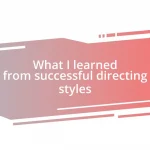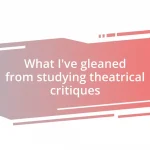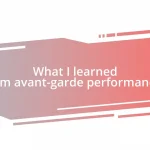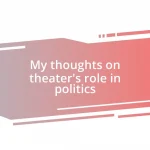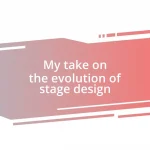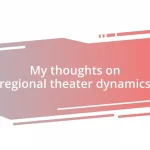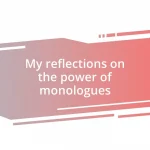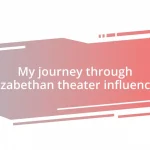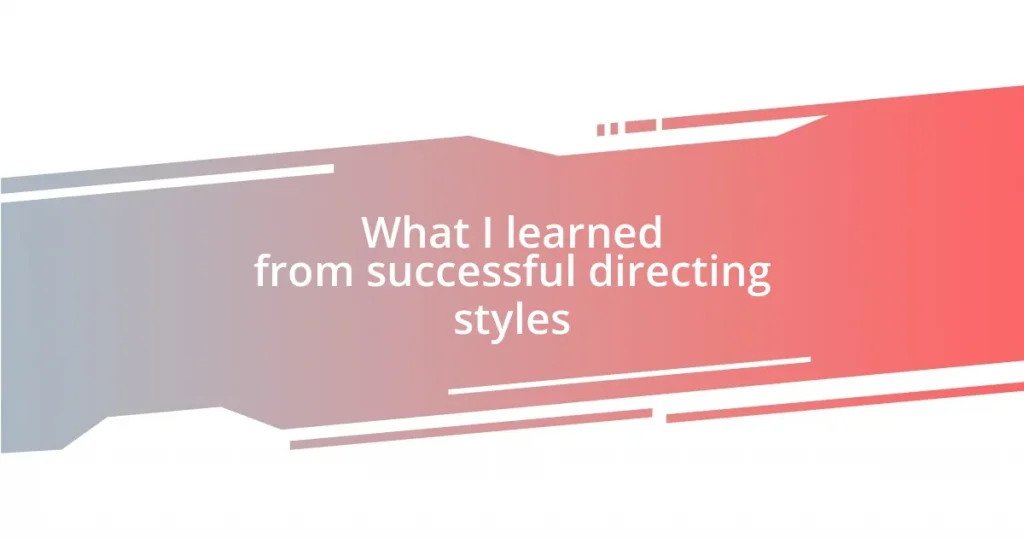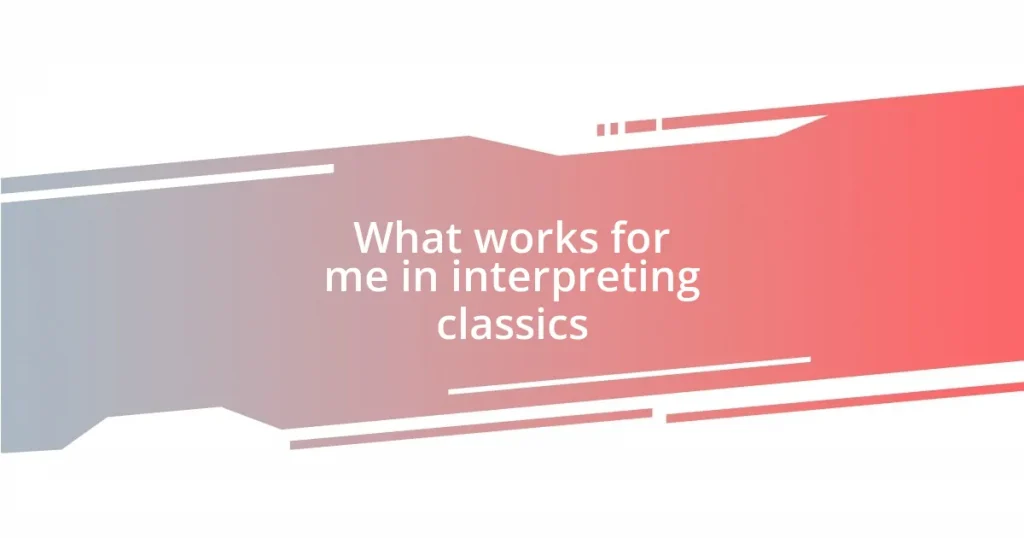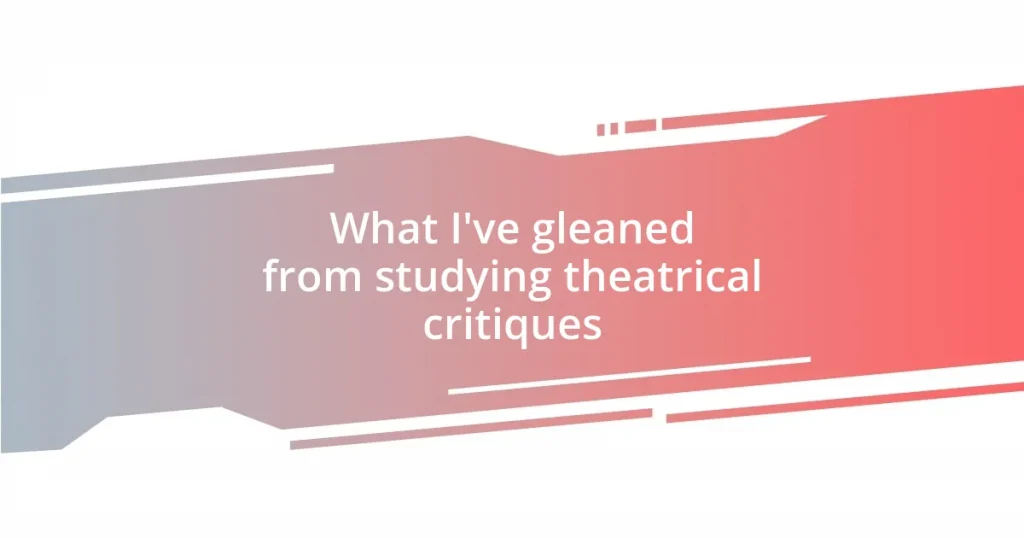Key takeaways:
- Acting workshops promote personal growth, boost confidence, and foster a sense of community among participants.
- Choosing the right workshop involves considering instructor experience, workshop focus, and class size for personalized feedback.
- Essential skills developed include empathy, improvisation, vocal skills, body awareness, and collaboration, which extend beyond acting.
- Investing in workshops leads to career advancement, valuable networking opportunities, and igniting passion and creativity.

Benefits of Acting Workshops
One of the most significant benefits of acting workshops is the opportunity for personal growth. I remember the first time I stepped onto the stage during a workshop; it was terrifying yet exhilarating. That initial fear turned into excitement as I learned to express emotions and thoughts I never knew I had. Don’t you think it’s amazing how stepping out of our comfort zone can lead to such transformative experiences?
Another advantage is the sense of community and connection that develops among participants. It’s incredible how strangers can quickly become friends through shared vulnerability in performing scenes together. I often reflect on the bonds formed during those late-night practices; there’s something special about collaborating on a craft that fosters intimacy and support. Have you ever felt that rush of camaraderie when everyone is working towards the same goal?
Moreover, acting workshops can significantly boost your confidence, both on and off the stage. I’ve spoken with many participants who found that their newfound skills in improvisation or character development spilled over into their everyday lives. Isn’t it empowering to realize that you can speak up in a meeting or express your thoughts clearly because of what you learned in a workshop? It’s amazing how these skills translate beyond acting, enhancing your overall presence.

Choosing the Right Workshop
Choosing the right acting workshop can feel overwhelming, but it’s essential to consider what aligns with your personal goals. For example, when I was selecting a workshop, I focused on instructors’ backgrounds and their teaching methods. I found that their experience not only shaped the content but also created a learning environment that fostered creativity and growth.
It’s also important to assess the workshop’s focus. Are you interested in improvisation, scene study, or maybe audition techniques? I recall attending a workshop centered on character development, which completely transformed my approach to acting. The value of immersing myself in one specific area allowed me to refine my craft more effectively than I initially expected.
When evaluating options, don’t forget to consider the class size. I once participated in an intimate workshop with just a handful of participants, and the personalized feedback I received was invaluable. In contrast, larger classes can offer diverse perspectives but might leave you with less direct attention. Finding a balance that works for you can greatly influence your experience and growth in acting.
| Factor | Consideration |
|---|---|
| Instructor Experience | Look for workshops led by industry professionals with teaching experience. |
| Workshop Focus | Consider whether you want to explore improvisation, scene study, or another specific area. |
| Class Size | Small classes offer personalized feedback, while larger ones provide varying perspectives. |

Essential Skills Developed
Essential Skills Developed
Through acting workshops, I learned that essential skills extend far beyond the stage. One pivotal moment for me was when I had to play a character completely different from my personality. This experience taught me empathy, as I had to understand not just the character’s lines but their motivations, feelings, and world view. It’s remarkable how stepping into someone else’s shoes can reshape how we perceive and relate to others in real life.
- Empathy: Understanding and connecting with various emotions and perspectives.
- Improvisation: Developing quick thinking and adaptability in unpredictable situations.
- Vocal Skills: Enhancing voice projection, clarity, and expression, which are key for clear communication.
- Body Awareness: Gaining control over physical presence, posture, and movement to communicate effectively without words.
- Collaboration: Learning the importance of teamwork when working with fellow actors to create a cohesive performance.
Every session seemed to unveil a new layer of skills I didn’t realize I needed. I remember a moment during one workshop where I had to give a monologue with very little preparation. The pressure forced me to tap into my vulnerability, showing me how authenticity resonates deeply with an audience. This taught me the value of preparation, honesty, and the power of being present—skills that transcend theatre and find their way into daily conversations and interactions.

What to Expect from Sessions
In my experience, attending an acting workshop feels like diving into a rich and supportive environment. You can expect a blend of structured exercises and spontaneous moments that push you to confront your fears. I recall a session where we had to perform a scene without any prior warning. The rush of adrenaline was unparalleled, and it taught me the power of being in the moment—an invaluable lesson for both acting and life.
As the sessions progress, you’ll likely receive personalized feedback, which can sometimes feel overwhelming, but it’s a crucial part of the growth process. After one intensive workshop, I remember feeling vulnerable but also incredibly empowered after receiving constructive criticism. The insights from my peers helped me view my performance through a new lens, and I found that embracing this feedback not only improved my acting skills but also my self-awareness.
You might also notice that sessions vary in energy and focus, which keeps things fresh and engaging. I once attended a workshop that shifted from intense scene work to a lighthearted improvisation game. Switching gears like that allowed me to explore different facets of my creativity. Have you ever found inspiration in unexpected places? I certainly did that day, discovering just how much fun can fuel my passion for acting.

Tips for Maximizing Learning
When it comes to maximizing your learning in acting workshops, staying open to feedback is essential. I can’t emphasize enough how transformative this can be. I remember a pivotal moment in one workshop when a fellow actor pointed out a subtlety in my delivery that I hadn’t noticed. It was like a light bulb went off! Engaging with others and welcoming their insights not only sharpened my skills but also fostered a supportive atmosphere where everyone thrived.
Another tip is to embrace every exercise with enthusiasm. I once approached a silly movement exercise with a bit of reluctance, but as I threw myself into it, I found unexpected joy in the freedom of expression. Have you ever discovered something profound while doing something seemingly trivial? Sometimes, it’s in those light-hearted moments that we learn to shed our inhibitions, allowing creativity to flow like never before.
Lastly, make it a habit to reflect on your experiences after each session. I began journaling my thoughts post-workshop, capturing what resonated with me the most. This practice not only deepened my understanding of the lessons learned but also made me more aware of my personal growth journey. Isn’t it fascinating how taking a moment to process can reinforce what you’ve absorbed? Reflective practices like this enrich the experience and help solidify your learning, ensuring that the skills you develop remain with you long after the workshop ends.

Investing in Your Acting Career
Investing in your acting career means more than just attending workshops; it’s about viewing each session as a stepping stone towards your dreams. I’ve often found that the monetary investment is trivial compared to the personal growth I encounter. For instance, after committing to a series of workshops, I unlocked a deeper understanding of my acting choices, which not only refined my skills but also rekindled my passion during moments of self-doubt. Have you ever felt that spark reignite simply from engaging in something you love?
Moreover, I’ve discovered that the connections made during these workshops are invaluable. Collaborating with other passionate actors opens doors to networking and future opportunities. I remember a particularly impactful experience where I partnered with someone who later invited me to audition for a project that aligned perfectly with my aspirations. It’s amazing how an acting class can turn into a bridge to new possibilities, isn’t it?
Ultimately, the blend of financial investment, personal relationships, and individual growth creates a powerful recipe for success. The time spent honing my craft and exploring my emotional range positions me to seize opportunities when they arise. I often reflect on how each workshop challenges me: What did I learn about my character today? How can I translate that into real-world experiences? These reflections bolster my confidence and readiness for the industry, making every moment count in my acting journey.

Real Success Stories from Workshops
I’ve seen firsthand how acting workshops can propel careers forward, often in ways you least expect. A friend of mine attended a workshop where the instructor emphasized improvisation. This friend was typically reserved, but that experience ignited a transformation. She not only acted more freely afterward but also landed a role in a community theater that eventually led to an agent notice. Isn’t it fascinating how one workshop can pivot someone’s entire trajectory?
I also recall a moment during a scene study workshop that has stuck with me. We were asked to perform a challenging piece that pushed our emotional boundaries. I felt a rush of vulnerability, but when I completed it, the applause from my peers felt like an affirmation of growth. It’s incredible how sharing those raw moments cultivates confidence. Have you ever felt that exhilarating rush after stepping out of your comfort zone?
Another powerful success story involves a group project in one of my workshops. We collaborated on creating an original short play, and through that process, I found my voice as a writer. Subsequently, I brought that play to life at a local festival, which not only showcased my work but also grabbed the attention of community directors. I often reflect on how workshops aren’t just about acting; they’re an incubator for creativity. What can you create when you allow yourself to explore?
